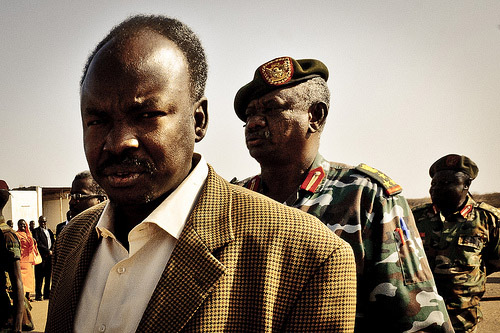
Upcoming elections in a heavily militarized border state have Sudan observers worrying that the exercise could lead to violence in an area whose stability is key to peace in Sudan. The vote, which was postponed since last April, will take place in South Kordofan state on May 2 and will select the state’s governor and legislative members. One candidate for governor is the notorious incumbent, Ahmed Haroun, who is wanted by the International Criminal Court for alleged war crimes in Darfur.
Elections could result in “localized violence” and “destabilize the state,” warned analyst Aly Verjee in a recent piece that provides background on the vote.
Ethnically, South Kordofan is a mix of the Nuba, and Misseriya and Hawazma Arab communities. Geographically and politically, the state is caught between North and South; South Kordofan sits atop the North-South axis and political power is split between the ruling SPLM and NCP. The area was an intense battleground during the civil war, between Sudanese government-armed Arab militias and largely SPLA-aligned Nuba. The Comprehensive Peace Agreement included a protocol aimed at addressing the specific causes of conflict in this border area. But, years after the signing of the agreement, little progress has been made in fulfilling its peace-building provisions, related not only to security issues, but also those of land and development.
Lack of implementation has resulted in a deep sense of abandonment and anger among many Nuba, as told in detail by Julie Flint in a report that warns of the dangers in continuing to leave Nuba grievances unaddressed. Flint writes:
Failure to satisfy the demands of the Nuba SPLA in the post-referendum negotiations could push veterans to take up arms again, with backing from disaffected youth who have few educational or employment opportunities.
Feelings of betrayal and resentment have been documented among Arab groups in the state as well.
Elections in South Kordofan and subsequent popular consultations are two important elements of the peace promised to the state’s population by the SPLM and NCP. Public perception of how the two exercises are conducted—how credible they are and the appeal of their results—will play a large role in how the population recalculates its level of confidence in the CPA and the two parties’ ability to deliver, with potentially violent repercussions. Verjee writes:
Whatever the elections’ merits, a vote that is perceived to lack legitimacy could be seriously destabilizing. There is a serious danger that if unfairly excluded from formal positions of power, the supporters of the SPLM and other opposition forces including those not contesting the elections will again conclude that democratization and political liberalization in Sudan has again failed, and that the only possible ways to pursue political change are outside the democratic instruments of competition.
In addition to simmering anger on the ground, increasing polarization and distrust between NCP and SPLM officials in the state and a multitude of armed actors with varying, and often fluid, agendas are causes for concern. Not only is South Kordofan home to large contingencies of the southern and northern armies, the SPLA and SAF, but the state also hosts joint units of both armies, historically Khartoum-backed Popular Defence Forces, or PDF, ethnic-based militias, a number of policing forces, and the Darfur rebel group, Justice and Equality Movement (see Small Arms Survey’s brief for more on these armed groups).
Last week, a militia attack on a village in South Kordofan left over 20 people dead, according to the deputy governor Abdelaziz al-Hilu, who is also competing against Haroun for the governor’s seat. Hilu alleged that the attacks were conducted by the PDF and instigated by Haroun as a means of preventing elections from taking place. Satellite Sentinel Project confirmed that over 350 buildings were intentionally burned down in the village.
In its focus on the southern referendum and interest in looking toward the imminent separation of the country, the international community has largely overlooked South Kordofan’s elections. But the goal of preventing renewed conflict in Sudan has not yet been met. Without vigilance, such as wider international monitoring of the vote and communications to party and state leaders that they will be held to account for instigating violence, South Kordofan could well unravel peace-making efforts.
Photo: South Kordofan governor and alleged war criminal Ahmed Haroun (Tim Freccia/ Enough)

